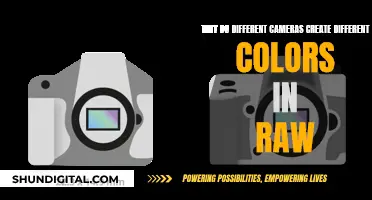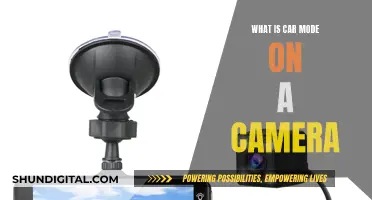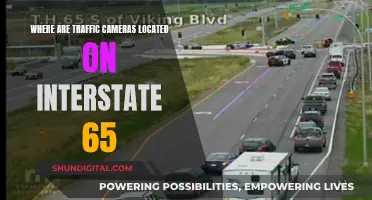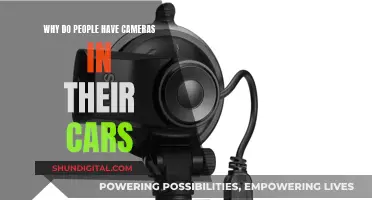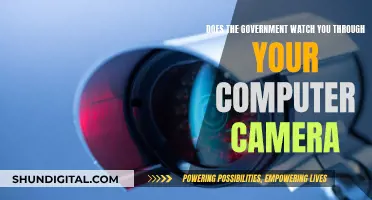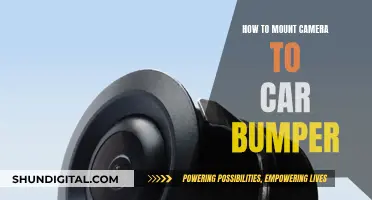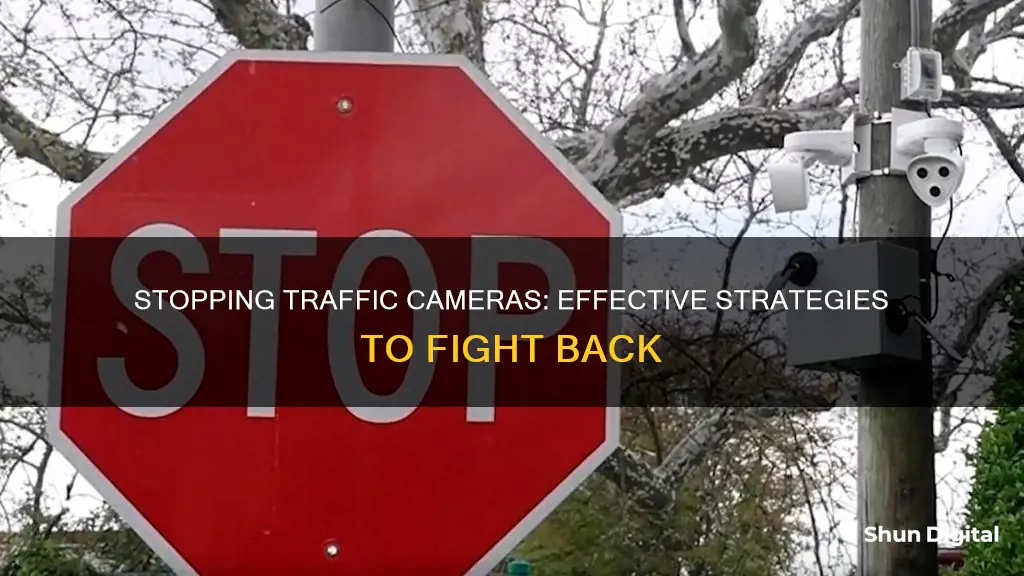
Traffic cameras are a highly controversial topic, with opponents arguing that they invade privacy and are used for financial gain, while authorities cite public safety as the primary reason for their installation. Traffic cameras are used to enforce traffic laws, commonly related to speeding, full stops at red lights, and passing school buses. While some states have banned automated traffic cameras, others have implemented them to enforce speed limits and traffic signals. The use of these cameras has raised questions about public safety, privacy, and drivers' rights, with some people taking extreme measures to avoid being fined.
| Characteristics | Values |
|---|---|
| Block license plate number | Use see-through covers or sprays to increase reflection |
| Tint windows | Dark window tinting to obscure identification |
| Phone apps | Use of apps to locate traffic cameras |
| Drive safely | Take a traffic school course |
| State laws | Varies by state, e.g. California has fines for hiding license plates |
What You'll Learn

Block your license plate
Blocking your license plate from traffic cameras is possible, but it's important to note that it may be illegal in your state or country. In California, for example, there is a $250 fine for using a product to hide your license plate.
License Plate Covers
License plate covers are made of strong, clear polycarbonate plastic. They have a thin layer of prismatic material that reflects light from cameras, making the license plate unreadable. The best ones are designed to work at the angle that roadside-mounted red light cameras operate at (around 20-22 degrees from the vehicle's path). When viewed directly from behind, the plate is readable, but as you move to the side, the cover obscures one or more numbers.
License Plate Sprays
Red light cameras use a strong flash to photograph license plates. Clear sprays for license plates reflect this flash back to the camera, causing the photo to become overexposed and unclear. A good-quality spray should be long-lasting and weather-resistant. Some sprays, like PhotoBlocker, make your plate shiny so that when a photo is taken with a flash, it becomes illegible.
Other Types of Blockers
- Acrylic and resin reflective gels reflect light back to the camera.
- Smart license plates with sensors can detect a camera flash and then trigger flashes on the sides of the plate, making it too bright for the camera.
- License plate flippers allow you to quickly rotate your license plate, changing the number.
- Smart glass license plate covers let you obscure your license plate with the push of a button.
The Pentax 6x7 Camera: A Vintage Classic
You may want to see also

Tint your windows
Tinting your windows can be an effective method to prevent traffic cameras from identifying you. By applying a dark tint to your windows, you can make it difficult for the cameras to capture your face clearly. This tactic has been used by some drivers to avoid being issued tickets for traffic violations.
However, it is important to note that window tinting laws vary by state. For example, in California, there is a legal requirement that 70% of light must pass through the front windows. Any additional reflective material on the windows is also prohibited. On the other hand, there are no such restrictions for the side and rear windows.
While tinting your windows can provide some level of anonymity, advancements in technology have made it increasingly challenging to evade detection. Newer traffic cameras are designed to identify faces even with tinted windows. Additionally, if you are pulled over by law enforcement, they may use test strips to measure the tint level of your windows, which could result in fines if they are found to be too dark.
It is also worth considering the potential consequences and risks associated with this practice. In some states, such as California, engaging in tactics to deliberately obstruct license plate visibility or facial recognition is illegal. Drivers who employ such methods may find themselves facing additional fines and penalties.
Therefore, while window tinting can be a potential countermeasure against traffic cameras, it is important to stay informed about the legal implications and remain mindful of the potential risks involved.
Surveillance Cameras: The Benefits of 15-900 Second Time Range
You may want to see also

Drive safely
Traffic cameras are installed at many intersections to catch reckless drivers when no police officers are around. They capture drivers who are speeding, running red lights and stop signs, or disobeying bus lane rules. As a result, some drivers have resorted to extreme measures to avoid getting a ticket in the mail. However, these measures can cause problems for traffic and may even result in unnecessary fines for the drivers themselves. For example, some drivers use objects to block their license plate numbers or apply dark window tinting to prevent identification. These tactics are illegal in California and other states, and there are fines for using products to conceal license plates or having excessively tinted windows.
Instead of trying to outsmart traffic cameras, the best way to avoid tickets is to simply drive safely. This means staying aware of your surroundings and following traffic rules and regulations. By driving defensively and obeying speed limits, you can minimize your risk of getting into an accident or receiving a ticket.
Taking a traffic school course can also help you become a safer driver. These courses teach you about your state's specific laws, defensive driving techniques, and accident prevention strategies. Completing a traffic school course may even reduce or eliminate any ticket penalties you incur.
Remember, the best way to avoid traffic camera tickets is to prioritize safe driving practices and adhere to the rules of the road. By doing so, you not only reduce your chances of getting a ticket but also contribute to a safer driving environment for yourself and others.
Traffic Camera Tickets: Payment Deadline and Consequences
You may want to see also

Understand local laws
Understanding local laws is crucial if you want to avoid traffic camera fines. While running a red light or stop sign is illegal across the US, states have different ways of implementing traffic enforcement cameras. Some states ban automated traffic cameras altogether, while others allow local governments to set up their own camera programs. Some states permit cameras only in specific areas, such as school zones, work zones, or near rail crossings.
For example, Alabama permits speed cameras in specific jurisdictions, such as Center Point and Midfield, while Arizona allows their use as long as it complies with state standards. Arkansas prohibits both speed and red-light cameras except in limited circumstances, such as school and highway work zones when a police officer is present. California, on the other hand, is starting to allow speed camera programs in some cities in 2024 and already permits red-light cameras.
The use of traffic cameras is a highly controversial topic, raising questions about public safety, privacy, and drivers' rights. While some states have enacted laws permitting or prohibiting their use, others have not addressed the issue. It's important to note that even if a state doesn't explicitly prohibit traffic cameras, you may still be able to challenge a ticket if the camera was installed in an area not permitted by state law. For example, if a state only allows speed cameras near schools and work zones, a ticket issued based on a camera outside of these areas may not hold up.
To avoid any legal issues and unexpected fines, it's essential to be aware of the specific laws in your state regarding traffic cameras. Knowing the regulations can help you understand the potential consequences of your actions and make informed decisions when driving.
Traffic Camera Tickets in Florida: Do I Pay?
You may want to see also

Challenge the photo evidence
Challenging the photo evidence from a traffic camera can be done in several ways. Firstly, it is important to review the photos and confirm that it is indeed your car in the image. If the license plate is not clearly visible, this may be a valid defence. If there is no photo of you in the driver's seat, this could also be a defence, particularly if you live in a jurisdiction that requires tickets to be issued to the driver, not the registered owner of the vehicle.
You can also request the full maintenance records of the camera, as well as the traffic light or speed monitoring system, to establish that they were regularly maintained and monitored. If the accuracy of the camera was not tested within a reasonable timeframe before the ticket was issued, the photo may be deemed unreliable as evidence.
In some jurisdictions, a red light camera photo is considered hearsay and may be inadmissible in court. Hearsay is an out-of-court statement used to prove the truth of the matter asserted. However, there are exceptions to the hearsay rule, so research your local laws.
You can also dispute the authenticity of the photograph by asserting your right to confront witnesses. The Sixth Amendment of the Constitution guarantees your right to cross-examine witnesses. Unless a witness appears who maintains the camera system, you do not have this opportunity. If no one from the company that maintains the camera testifies, you can object to the use of the photographs for lack of foundation.
Additionally, you can argue that the prosecution cannot prove it was you driving the car, especially if the photos do not clearly show who was driving. Furthermore, the photo does not prove that the traffic light was functioning properly. The prosecution must prove that the traffic light and the camera were working correctly for the photo to be considered valid evidence.
Finally, you can raise other possible defences, such as a necessity defence for speeding. For example, if you were speeding to get to the hospital in an emergency, this may be accepted as a valid defence, even if you do not deny the violation.
Kia Car Cameras: Locations and Functions Explained
You may want to see also
Frequently asked questions
You can't hide from traffic cameras, but you can avoid getting a ticket by driving safely and staying aware of your surroundings.
Some products claim to make it difficult for a traffic camera to capture your license plate, such as see-through covers and reflective sprays. However, these products are likely ineffective and may result in a fine in some states.
The use of traffic cameras is highly controversial and has raised questions about public safety, privacy, and drivers' rights. While some states in the US have banned automated traffic cameras, others allow their use for enforcing traffic signals and speed limits.


